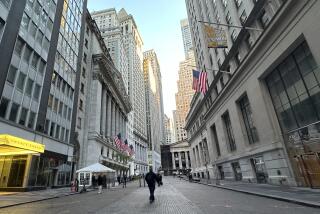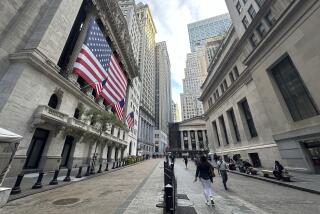Strong Economic Data Send Stock, Bond Markets Into a Tumble
Another set of healthy economic statistics gave the stock and bond markets a headache Friday as investors started worrying again that inflation and higher interest rates may be on the way.
On the slowest day of trading so far this year, the Dow Jones industrial average fell 31.44 points to 5,616.21, on top of Thursday’s decline of nearly 65 points. For the week, the Dow was down 106.53 points.
The news also caused bond prices to drop sharply, sending the yield on the 30-year Treasury bond to 7.12%, up from 7.03% on Thursday.
“The economic news continues to be stronger than the majority had anticipated--and what the [Federal Reserve Board] probably desires--so it has conjured up concern,” said Alfred Goldman, vice president at A.G. Edwards & Sons Inc. in St. Louis.
The numbers are making market watchers increasingly worried about the important August employment figures coming next Friday and what they might mean for Fed thinking on interest rates, he said.
Declining issues outnumbered advancers by about a 9-5 margin on the New York Stock Exchange, a trend that was exacerbated by light trading volume.
Only 257 million shares changed hands on the day before the extended Labor Day weekend, the slowest for a full session since Dec. 26, the Tuesday after Christmas.
The NYSE composite index fell 2.37 points to 350.99. The Standard & Poor’s 500-stock index was down 5.41 points at 651.99, and the Nasdaq composite index fell 2.95 points to 1,142.08. The American Stock Exchange market value index fell 1.66 points to 559.68.
Although the government reported that consumer spending and income rose modestly in July, factory orders rose a sharp 1.8% during the month, well beyond predictions of about 1%.
The Chicago purchasing managers index rose to 60% in August. Market watchers had expected about 52%. Any reading above 50% indicates an expansion in manufacturing.
Investors will get an even better picture of economic growth next week, with the release of a string of economic reports including the National Assn. of Purchasing Managers index and the closely watched payroll report on Friday.
The Dow slid as much as 53.64 points before rebounding Friday. That ride followed Thursday’s 64.73-point drop, making for an average two-day decline of 1.7%.
Among Friday’s highlights:
* The rise in bond yields affected interest rate-related stocks. Chase Manhattan lost 1 1/2 at 74 3/8; home builder Centex lost 3/4 at 32 1/8; Sallie Mae lost 2 1/4 at 73 5/8.
Exceptions to this trend were some smaller banks, which several analysts said rose because they are being perceived as takeover targets after the announced buyout of St. Louis-based Boatmen’s Bancshares by giant NationsBank for $60.27 a share. Boatmen’s shares rose 10 5/16 to 53 1/4; NationsBank lost 7 1/4 to 85 1/8 as market players perceived the price might be too high.
In another proposed bank merger, Walden Bancorp rose 7 3/4 to 28 1/4 after UST said it would pay 30 7/8 a share for the Acton, Mass.-based savings and loan.
* ValuJet jumped 1 1/2 to 12 1/2 after the discount air carrier, which was grounded for safety violations, won tentative approval from U.S. regulators to resume flights on a limited schedule.
* A number of consumer growth stocks fared poorly because of the strong economic news. Johnson & Johnson dropped 5/8 to 49 1/4, its fifth retreat in six days. Coca-Cola slid 3/8 to 50.
* Big gainers included cyclical stocks, including Chrysler, up 7/8 to 29 1/4, and CSX, up 5/8 to 50 5/8. Asarco rose 3/8 to 25 7/8.
* Dell Computer received a boost after Standard & Poor’s said its shares would be added to the benchmark S&P; 500 index next Thursday. The direct-order PC maker rose 1/2 to 67 1/8.
* Philip Morris, which makes Marlboro cigarettes, said it is the subject of a Justice Department investigation relating to nicotine in its products. Its shares fell 5/8 to 89 3/4.
Overseas, Mexican stocks fell for a third day and the peso plunged as soaring U.S. bond yields and political turmoil in Mexico prompted investors to sell their holdings ahead of the Labor Day weekend. Mexico City’s Bolsa index fell 29.43 points, or 0.88%, to 3305.47, its lowest level since Aug. 14.
Market Roundup, D4
More to Read
Inside the business of entertainment
The Wide Shot brings you news, analysis and insights on everything from streaming wars to production — and what it all means for the future.
You may occasionally receive promotional content from the Los Angeles Times.










